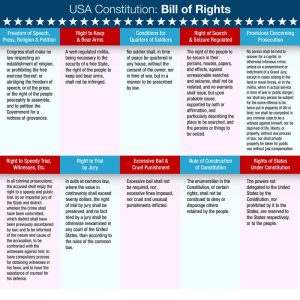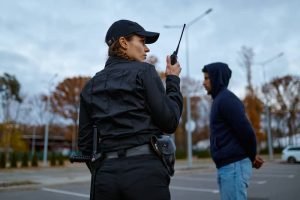Should I talk to the police? 
If you are suspected of a crime, the police likely will want to question you.
A police officer may try to get you to talk by telling you that it is in your best interest to cooperate and “answer some questions to clear things up.”
They may even add an “I’ll put a good word in for you with the Judge” or “I’ll talk to the DA.”
Do not be fooled- what you tell the police can and often will be used against you in a court of law.
You have the right to remain silent.
We think it is often a good idea to exercise that right.
If the police try to pressure you into talking, tell them that you want to speak with a criminal defense attorney before saying anything.
In the post we will discuss three main points:
- When can a police officer question you?
- What rights do you have during questioning?
- What should you do if the police try to pressure you into talking?
Was does Taking the Fifth mean?
The Fifth Amendment of the United States Constitution protects citizens from being forced to incriminate themselves. 
This means that you have the right to remain silent when questioned by a police officer, detective, State Trooper, and any law enforcement officer.
This right applies whether you are under arrest or not.
It applies to a criminal investigation as well as traffic stops. You don’t have to be sitting in an investigation room at the police station.
The Fifth Amendment also protects citizens from having to give self-incriminating testimony in a court of law.
The Supreme Court, in 1966, ruled in Miranda v. Arizona that people must be advised of their Miranda rights before being interrogated by law enforcement officers.
These rights include the right to remain silent and the right to an attorney. You have the right to an attorney even if you cannot afford one- under the law, an attorney may be appointed to you.
If you are questioned by a police officer, we strongly recommend you Take the Fifth and Lawyer Up (seek legal advice from an experienced criminal defense attorney.)
Protect your legal rights and immediately establish an attorney-client relationship.
When can the police question you?
There is no law in North Carolina that prevents a police officer from starting a conversation with you. 
They’re allowed to engage you in a conversation. A criminal defense lawyer may call that a “voluntary contact.”
The police officer is not required to disclose he or she is conducting a criminal investigation or that you are a person of interest or a suspect in a crime.
They can ask you questions like, “Where are you going?” or “Where have you been?” or “What are you doing?”
And while they may ask questions, you may not be required to give provide any sort of answers or respond.
Each case is different. That’s why it makes sense to talk to a lawyer.
In the context of a voluntary contact, you don’t need to provide your name or ID. You also do not have to allow the police officer to enter your residence without a warrant.
It’s often better not to say anything. Decline to be searched.
Ask if you are under arrested or being detained. And if given the chance to leave, leave.
As such, a police officer can attempt to question you, whether you are under arrest or not.
If the police try to question you while you are under arrest, your criminal defense attorney may refer to that as a “custodial interrogation.”
Whether someone is in custody or arrested deserves careful by legal professionals. It’s a complicated area of law – John Fanney, Raleigh Criminal Lawyer
In the most simple terms, the legal standard is whether a reasonable person feel free to leave and disengage with law enforcement.
We think it’s a good idea to politely tell police officers that you want to speak with an attorney first and remain silent, even if the police keep trying to ask questions or pressure you.
Am I being detained?
The test to see if someone is being detained comes down to whether a reasonable person would feel free to leave.
If you are going to talk to the police, even minimally, it is OK to ask police officers, “Am I being detained? Am I under arrest? Am I free to leave?”
Make sure to remain calm and be polite. 
Those questions are well within your constitutional rights. You cannot be punished for exercising your Constitutional Rights.
If the police tell you “you cannot leave” or they are “conducting an investigation,” ask them specifically whether you’re under arrest or being detained.
In those instances, your Miranda rights may apply.
It’s also completely legal to ask, “What is your reasonable suspicion? What crime, if any, have I committed? What crime or crimes do you suspect I am committing or have committed?”
If you are free to leave, not detained or arrested, and the conversation is a “voluntary contact,” there likely is no Miranda requirement.
In those instances, it is likely the police officer may not be required to read or advise you of your 5th Amendment Rights.
Exercise your legal rights, including your right to remain silent.
Do not talk to the police.
Seek the advice of an experienced criminal defense attorney.
Am I free to leave?
Sometimes it’s not entirely clear if someone if free to leave or not. And that might be based on a number of factors:
- The number of officers present
- Whether the officers have their guns drawn
- Whether an officer has placed his hand on his gun
- Whether an officer has physically touched you or put their hands on you
- Have the police blocked you or kept you from leaving?
- Did you go to the police station voluntarily?
What rights do you have during questioning?
As we discussed before, you have the right to remain silent and the right to an attorney.
You are not required to talk to the police without a lawyer present.
You should exercise these rights even if the police say that it is in your best interest to cooperate or answer their questions.
Law enforcement rarely wants an attorney present.
If an officer suspects you’ve done something wrong, they don’t necessarily see your exercising your Fifth Amendment rights as a good thing.
That’s because they’re supposed to stop asking questions.
That often limits the information they have and the evidence against you.
Remember this: Police always want a confession if they can get it – John Fanney, Criminal Defense Lawyer
When an officer asks questions, there is normally a reason.
They’re not just being nice or conversational.
That’s as true for a traffic violation as a formal investigation for a criminal case involving a possible crime or felony or misdemeanor allegation.
You cannot be forced to talk to the police or waive your right to remain silent.
Information About Assault Charges
We think it’s in your best interests to immediately contact a criminal lawyer with substantial experience and establish an attorney-client relationship as soon as possible.
Criminal cases, particularly those involving incriminating statements, tend to be relatively complex.
Furthermore, going to court by yourself, trying to negotiate a dismissal or plea bargain with a district attorney, puts you at a tremendous disadvantage.
Prosecutors are well-versed in the law. They do not represent you or your best interests. They represent the State of North Carolina.
They are not required to advise you of your legal rights or options in the legal system.
What should you do if the police try to pressure you into talking?
If the police try to pressure you into talking, tell them that you want to speak with an attorney before saying anything else.
- Tell them you do not wish to give a statement or answer questions
- Tell them you do not consent to any type of search, including a “pat down” or “frisk”
- Tell them you wish to leave
- Leave if you are allowed to do so.
It’s extremely important you remain polite and calm, even if police attempt to escalate the situation.
Many police encounters are now recorded by police officers wearing BWC or Body Worn Camera.
Do I need a Lawyer for Domestic Violence charges?
What you say, and frankly how you act, may eventually come into evidence.
Talking to the police in a rude or impolite manner truly does not help.
You want to be the reasonable person, even if law enforcement are not.
It’s better to be nice while exercising your rights, including remaining silent.
Do not try to engage with or be rude to law enforcement. Do not give them additional reasons to ask more questions.
You don’t have to explain or justify something that was never said.
 North Carolina Criminal Law Updates
North Carolina Criminal Law Updates